What Happened to All the Scareware – For Now?
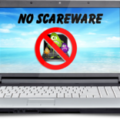
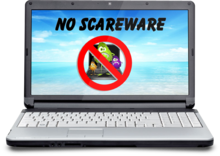 A report from the reputable antivirus vendor “Kaspersky Labs” has indicated that the rate of fake antivirus program attacks (scareware) has decreased substantially. In June 2011, they observed between 50,000 and 60,000 attacks per day, but by October 2011, the number of attacks had dropped to under 10,000 a day. Now these are their numbers and not mine. The fact is that most all the antivirus vendors have failed miserably in protecting our computers from Fake Antivirus programs, so there is no way that they can know the real number. Otherwise, if they knew how to detect it, their software should have prevented it in the first place.
A report from the reputable antivirus vendor “Kaspersky Labs” has indicated that the rate of fake antivirus program attacks (scareware) has decreased substantially. In June 2011, they observed between 50,000 and 60,000 attacks per day, but by October 2011, the number of attacks had dropped to under 10,000 a day. Now these are their numbers and not mine. The fact is that most all the antivirus vendors have failed miserably in protecting our computers from Fake Antivirus programs, so there is no way that they can know the real number. Otherwise, if they knew how to detect it, their software should have prevented it in the first place.
I don’t know the countries where the remaining attacks were concentrated, but it seemed as if the fake antivirus business was still running strong up until about April 2012, at least here in Hawaii. My observations are not scientific and are solely based on my daily workload in removing these fake antivirus programs from customers computers, but I can tell you that there has been a “HUGE” decrease in these types of infections coming into my shop in the last 2-1/2 months or so. Read More Here…
I Am NOT Affiliated with DoubleMySpeed.com (aka CyberDefender, MaxMySpeed.com and MyCleanPC.com)

 During the last couple weeks, I have been getting several phone calls from around the country asking if I was with DoubleMySpeed.com. These people were all looking for a refund. Somehow, they got my phone number off the web making them think so. I am just a guy that runs an independent computer repair shop in Hawaii. About the only connection you can say I have with DoubleMySpeed.com is that I have blogged about them “very negatively” on many occasions. I know some of my blog posts have ranked in connection with DoubleMySpeed’s name because of my negative reviews, so I assume my phone number popped-up in the search engines as well for DoubleMySpeed.com (aka CyberDefender, MaxMySpeed.com and MyCleanPC.com).
During the last couple weeks, I have been getting several phone calls from around the country asking if I was with DoubleMySpeed.com. These people were all looking for a refund. Somehow, they got my phone number off the web making them think so. I am just a guy that runs an independent computer repair shop in Hawaii. About the only connection you can say I have with DoubleMySpeed.com is that I have blogged about them “very negatively” on many occasions. I know some of my blog posts have ranked in connection with DoubleMySpeed’s name because of my negative reviews, so I assume my phone number popped-up in the search engines as well for DoubleMySpeed.com (aka CyberDefender, MaxMySpeed.com and MyCleanPC.com).
Their emergency PC Support ph# is listed as (866) 793-0453 at http://www.cyberdefender.com/
Click “Read More” button below for full article.
How to Unhide Programs and Folders Hidden by FakeHDD Alert Programs

 I mentioned this in a previous post but I wanted to bring it up again because I continue to see a variety of “malicious” FakeHDD Alert programs that are rendering people’s computers almost useless because it hides many of your programs, files and folders.
I mentioned this in a previous post but I wanted to bring it up again because I continue to see a variety of “malicious” FakeHDD Alert programs that are rendering people’s computers almost useless because it hides many of your programs, files and folders.
The biggest preliminary caution about this type of infection is to “NOT” run a Temp File cleaner like CCleaner until “AFTER” you have restored your Program File shortcuts. While cleaning the temp files would normally be one of the early steps you should perform, in this case, you would be deleting the folder that the malicious program is hiding them in, namely C:\Windows\Temp\smtmp. Read More Here…
How to Remove “Privacy Protection” Malware
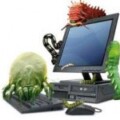
Removing “Privacy Protection” Malware with System Restore
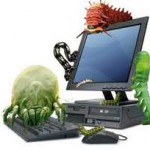 Manually removing malware, especially Fake Alerts like “Privacy Protection” is a fine art practiced by dedicated, starving PC Technicians. It isn’t something that is taught so much as it is a skill that needs to be absorbed by years of hands-on experience. Because of the ever changing cat-and-mouse game involved with battling malicious software (malware), it is not something the average person is trained or equipped for. But for the average person who wants to take a stab at it, read on… Read More Here…
Manually removing malware, especially Fake Alerts like “Privacy Protection” is a fine art practiced by dedicated, starving PC Technicians. It isn’t something that is taught so much as it is a skill that needs to be absorbed by years of hands-on experience. Because of the ever changing cat-and-mouse game involved with battling malicious software (malware), it is not something the average person is trained or equipped for. But for the average person who wants to take a stab at it, read on… Read More Here…
My Hard Drive is Bad and all My Programs and Data are Gone! … Or are They?
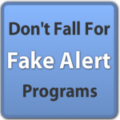
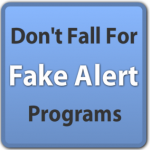 I’ve been seeing an increase in a different type of Fake Alert program in the last few months that are really annoying. I suppose the masses are now aware of the Fake Antivirus, AntiSpyware and Registry Cleaner programs by now, but there are other types of Fake Alert programs that may catch you off guard and people are falling for them. One such Fake Alert are computer analysis and optimization programs in the the Fake Hard Disk Drive (FakeHDD) family of programs.
I’ve been seeing an increase in a different type of Fake Alert program in the last few months that are really annoying. I suppose the masses are now aware of the Fake Antivirus, AntiSpyware and Registry Cleaner programs by now, but there are other types of Fake Alert programs that may catch you off guard and people are falling for them. One such Fake Alert are computer analysis and optimization programs in the the Fake Hard Disk Drive (FakeHDD) family of programs.
The majority of these FakeHDD programs involve making you think your hard drive is going bad and that you have lost data. While it is possible for a bad hard drive to still work well enough to boot to Windows, some of the errors these FakeHDD programs warn you about should be fatal to your system. And if that were true, your computer shouldn’t even work enough to for you to even be seeing the alert. I hope that makes sense. Two FakeHDD programs I have been seeing recently are called “System Restore” and “Data Restore“. Some of the fake errors you might see are: Read More Here…
How to Remove CyberDefender – aka MyCleanPC.com and DoubleMySpeed.com
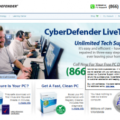
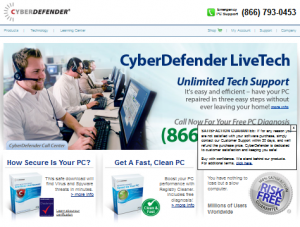 I have warned about CyberDefender’s “borderline scam” before under my “Reviews” category. But it seems like a good time to get out the warning again, especially since the economy has prompted so many people to try and fix their own computer problems, rather than to have them fixed by a professional. I call it a “borderline scam” because they probably do just enough to fulfill some bare-minimum, mumbo-jumbo legal requirement. First of all, MyCleanPC.com and DoubleMySpeed.com are alias websites for CyberDefender.com. These websites are all owned by the same company, which all promote the same products such as CyberDefender PC Checup, Early Detection Center, and Registry Cleaner. Read More Here…
I have warned about CyberDefender’s “borderline scam” before under my “Reviews” category. But it seems like a good time to get out the warning again, especially since the economy has prompted so many people to try and fix their own computer problems, rather than to have them fixed by a professional. I call it a “borderline scam” because they probably do just enough to fulfill some bare-minimum, mumbo-jumbo legal requirement. First of all, MyCleanPC.com and DoubleMySpeed.com are alias websites for CyberDefender.com. These websites are all owned by the same company, which all promote the same products such as CyberDefender PC Checup, Early Detection Center, and Registry Cleaner. Read More Here…

